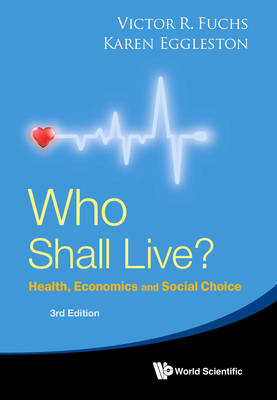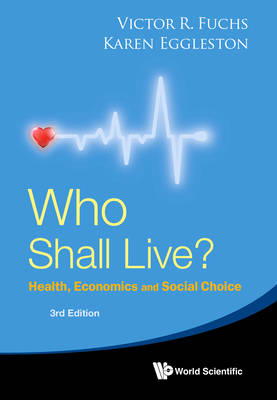
- Retrait gratuit dans votre magasin Club
- 7.000.000 titres dans notre catalogue
- Payer en toute sécurité
- Toujours un magasin près de chez vous
- Retrait gratuit dans votre magasin Club
- 7.000.000 titres dans notre catalogue
- Payer en toute sécurité
- Toujours un magasin près de chez vous
Who Shall Live? Health, Economics and Social Choice (3rd Edition)
Victor R Fuchs, Karen N Eggleston
Livre relié | Anglais
119,45 €
+ 238 points
Description
'Vic Fuchs' Who Shall Live? is the most important book ever on health economics. It has inspired us all these many years, and it is terrific to see a new edition, post-Obamacare and post-pandemic.'Sir Angus S DeatonRecipient of the Nobel Prize in Economics 2015'In considering the great health challenges of our time Victor Fuchs' work remains more important than ever. In the third edition, Fuchs' seminal text has been expanded to reflect recent policy and politics. It remains essential reading to better understand the complex interaction between social determinants, health and health care costs.'Victor J Dzau, MDPresident, National Academy of MedicineSince the first edition of Who Shall Live? (1974), over 100,000 students, teachers, physicians, and general readers from more than a dozen fields have found this book to be a reader-friendly, authoritative introduction to economic concepts applied to health and medical care.Health care is by far the largest industry in the United States. It is three times larger than education and five times as large as national defense. In 2001, Americans spent over $12,500 per person for hospitals, physicians, drugs and other health care services and goods. Other high-income democracies spend one third less, enjoy three more years of life expectancy, and have more equal access to medical care.In this book, each of the chapters of the original edition is followed by supplementary readings on such subjects as: 'Social Determinants of Health: Caveats and Nuances', 'The Structure of Medical Education -- It's Time for a Change', and 'How to Save $1 Trillion Out of Health Care'.The ten years following publication of the 2nd expanded edition in 2011 were arguably more turbulent for US health and health care than any other ten-year period since World War II. They span the implementation of the Affordable Care Act, the deepening opioid epidemic, and the physical, psychological, and socio-economic traumas of the COVID-19 pandemic.An important new contribution to this book is to describe and analyze the changes in five sections: 'The Affordable Care Act and the Uninsured', 'Health Care Expenditures', 'Health Outcomes', 'The COVID-19 Pandemic', and 'Health and Politics'. This part includes 24 tables and figures.This book will be welcomed by students, professionals, and life-long learners to gain increased understanding of the relation between health, economics, and social choice.
Spécifications
Parties prenantes
- Auteur(s) :
- Editeur:
Contenu
- Nombre de pages :
- 316
- Langue:
- Anglais
Caractéristiques
- EAN:
- 9789811268502
- Date de parution :
- 18-09-23
- Format:
- Livre relié
- Format numérique:
- Genaaid
- Dimensions :
- 152 mm x 229 mm
- Poids :
- 557 g







